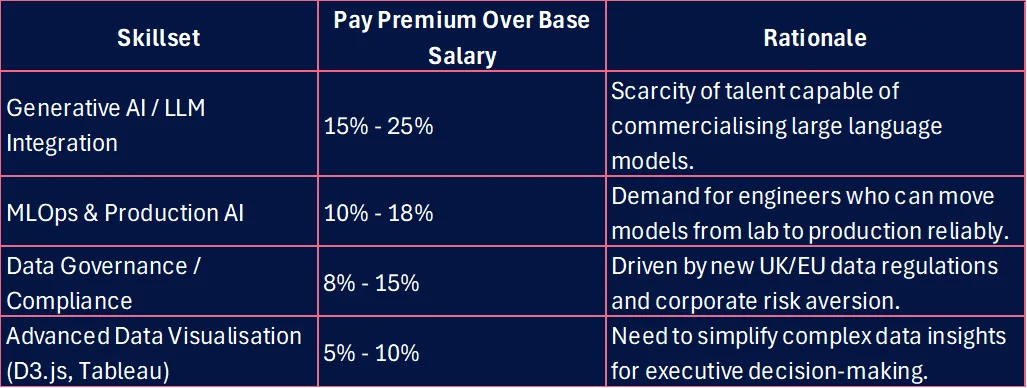Mastering UK Tech Talent Recruitment: 2025 Salary Benchmarks
20 Oct, 20258 minutesIntroduction: The New Reality of UK Tech Talent RecruitmentThe landscape of UK Tech Talent R...

Introduction: The New Reality of UK Tech Talent Recruitment
The landscape of UK Tech Talent Recruitment in 2025 is defined by two key forces: persistent demand for niche, high-impact skills (particularly in AI and Cybersecurity) and a market correction where caution meets compensation. For executive leaders and HR professionals, understanding the true cost of securing high-quality talent outside of London, in hubs like Manchester, Bristol, and Glasgow, is no longer optional; it is the foundation of a successful hiring strategy.
This comprehensive guide moves beyond simple figures to provide actionable Tech Salary Benchmarks 2025, critical regional insights, and a deep dive into the non-monetary factors that drive retention. Our goal is to equip you with the market intelligence necessary to build a competitive and sustainable UK Tech Talent Recruitment model, ensuring every hire contributes immediately to your strategic goals.
Chapter 1: Executive Compensation and Strategic Leadership
The salaries at the top tier reflect the severity of the challenges faced by organisations today. Leaders in this bracket are expected to oversee monumental shifts in infrastructure, security, and product direction, making them crucial investments in your Digital Transformation Strategy.
The Cost of C-Suite and Director-Level Expertise
C-Suite compensation is no longer just about management experience; it’s about tangible, documented success in scaling technology platforms and navigating regulatory landscapes. A Chief Technology Officer (CTO) in 2025 is valued for their ability to deliver a coherent technical roadmap while maintaining budgetary discipline. A Chief Information Security Officer (CISO) commands a premium due to the sheer cost of non-compliance and reputational damage from breaches.

Analysis of Executive Compensation Trends:
We are seeing a trend where employers are more selective, favouring proven delivery over raw potential. The upper quartile for CTOs often includes significant performance-based bonuses (up to 30% of base) and equity, reflecting the direct impact these leaders have on revenue. If you are struggling to secure executive-level candidates, refining your Digital Transformation Strategy to offer clear ownership and autonomy over key projects can be a powerful non-monetary lure.
For companies based outside of London, the ability to attract top-tier leadership hinges on offering highly flexible or remote-first contracts, often with London-comparable pay bands, especially for roles overseeing complex, multi-site operations.
Chapter 2: The Core Engineering Engine: Specialist Tech Roles
The heart of any tech organisation is its engineering core. While many entry-level roles have seen muted salary growth, mid to senior-level Specialist Tech Roles remain fiercely competitive, particularly those involving full-stack development, cloud infrastructure, and data science. This segment is crucial for effective UK Tech Talent Recruitment.
2.1 Deep Dive: The Developer Landscape (JavaScript, Python, DevOps)

Regional Salary Nuances for Developers:
The regional variation in the UK remains a defining feature of the salary landscape. While London maintains its premium, major regional hubs are closing the gap for high-value Specialist Tech Roles.

To understand how our services can help you access these regional talent pools without the administrative burden, please visit our page dedicated to UK Tech Talent Recruitment solutions.
2.2 The Product and UX/UI Ladder
Product management professionals are the linchpin between technology and commercial success. Their salaries reflect their ownership of the P&L and strategic roadmap.

Product Managers with demonstrable experience in launching generative AI features or scaling complex B2B SaaS platforms are commanding top-tier salaries, pushing the upper limit of these Tech Salary Benchmarks 2025.
Chapter 3: In-Demand Skills and Market Value Drivers
Salaries are increasingly segmented by skills rather than just years of service. A candidate with three years of deep experience in a niche technology can easily surpass a candidate with ten years of generalist experience. This makes effective skill identification paramount for UK Tech Talent Recruitment.
3.1 The AI & Data Premium
The integration of AI into business operations is the single biggest factor influencing pay increases in 2025.

3.2 The Cloud and Security Imperative
Security is no longer a bolt-on; it's a foundational skill required across engineering teams. The most valued professionals in this space are those who accelerate business while managing risk.
- Cloud Architecture (AWS/Azure/GCP Certification): Solutions Architects with certification often see a £10,000 - £20,000 bump over their peers, particularly those with multi-cloud experience (Source: Cloud Developer Salary Trends).
- Zero Trust Architecture: CISOs and Security Architects who can design and implement Zero Trust models are essential for compliance and protection in hybrid working environments.
- Microservices and Kubernetes: Deep understanding of containerisation and orchestration remains crucial for scaling applications, justifying the high salaries commanded by Senior DevOps Engineers.
For organisations navigating this complex skills landscape, understanding the competitive nature of these Specialist Tech Roles and how they impact your wider Digital Transformation Strategy is key to securing budget and retaining talent.
Chapter 4: The Holistic Approach: Employee Value Proposition (EVP)
While base salary sets the expectation, the total Employee Value Proposition (EVP) secures the commitment. In 2025, non-monetary benefits and cultural factors are the most significant differentiators for attracting top UK Tech Talent Recruitment targets.
4.1 Flexibility as a Financial Benefit
Flexibility has solidified its position as a core component of compensation, effectively replacing the London Living Allowance in many regional or remote roles. According to recent market analysis, work-life balance has soared in importance for employees globally, becoming their top motivator and pushing pay into second place (Source: Global Work-Life Balance Survey).
Key Elements of a Strong Employee Value Proposition (EVP):
- Work Location: Offering remote-first or a truly flexible hybrid model (e.g., 1 day per month in office) is necessary. Mandating 3+ days in the office severely limits your talent pool and requires a pay premium to overcome the cultural drawback. Professionals strongly prefer roles offering hybrid or remote work options (Source: Henderson Scott Technology Salary Guide 2025).
- Learning and Development (L&D): Companies offering dedicated, paid time off (e.g., 10 days per year) for training, upskilling, and certification are highly attractive. This includes funding for AI literacy programs, as 98% of tech workers want to enhance their AI knowledge.
- Wellness and Culture: Comprehensive health insurance, enhanced parental leave, and generous annual leave (28+ days) are now baseline requirements. Furthermore, cultural markers like diversity, equity, and inclusion (DE&I) initiatives are critical for retention.
- Equity and Long-Term Incentives (LTIs): For mid-level and senior hires in scale-ups, equity packages provide a long-term stake that encourages stability and loyalty, mitigating the risk of short-term salary poaching. This is a crucial element of a competitive Employee Value Proposition (EVP), particularly when competing with Big Tech.
The war for talent is shifting; candidates are measuring their Employee Value Proposition (EVP) against lifestyle improvements. Organisations must view these benefits not as costs, but as necessary investments in productivity and retention.
Chapter 5: Strategic Planning for Digital Transformation Strategy in 2025
Achieving a successful Digital Transformation Strategy requires foresight in hiring. The 2025 market will reward companies that are proactive in filling skills gaps related to AI integration, while the rest face increasing technical debt and rising costs.
- The Proactive Approach: Focus UK Tech Talent Recruitment efforts on hiring "translators", individuals, typically Product Managers or Solution Architects, who can bridge the gap between business needs and complex AI/Cloud architecture. Their salary is justified by their ability to accelerate projects and minimise expensive technical missteps.
- The Cost of Delay: Companies delaying their investment in key Specialist Tech Roles will find that inflationary pressures, particularly on Python/ML Engineers and senior DevOps talent, continue to push salaries upwards by an average of 7% in the top quartiles, significantly impacting budget stability.
- The Talent Pipeline: Investing in junior talent (often with lower entry salaries) is a cost-effective long-term Digital Transformation Strategy. However, this requires a robust L&D framework and strong mid-level mentors, which itself is a hidden cost factored into mid-level Tech Salary Benchmarks 2025.
Ultimately, market stability is expected to improve later in 2025, but the demand for specific, high-impact Specialist Tech Roles will not subside. Organisations that master their UK Tech Talent Recruitment strategy now will define the future.
Looking for Industry-Leading UK Tech Talent Recruitment?
Securing top-tier UK Tech Talent Recruitment requires more than just high salaries; it demands precise market data, a deep understanding of regional variations, and the ability to articulate a compelling Employee Value Proposition (EVP).
Whether you need executive search for a CTO, strategic advice on setting Tech Salary Benchmarks 2025, or rapid deployment of Specialist Tech Roles, our industry experts are ready to partner with you.
- Learn more about our core services and how we deliver exceptional value on our Standard Recruitment page.
- Contact us directly to discuss your specific Digital Transformation Strategy and hiring needs.
- You can also review our previous thought-leader pieces on the skills required for modern FinTech roles



